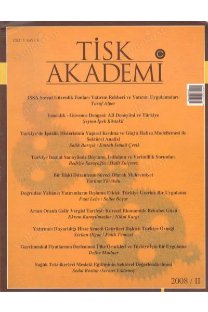Türk endüstri ilişkiler sisteminde 2010 anayasa değişikliği ve sonrası gelişmeler
Endüstri ilişkileri sisteminin işleyişini hukuki alt yapı belirlemektedir. Hukuki alt yapı, ekonomik ve sosyal hakların muhtevasını da belirleyici olmaktadır. Bu çalışmada 2010 Anayasa değişikliği ve bu değişikliğe bağlı olarak düzenlenen toplu iş hukukuna ilişkin kanunlarda yapılan değişikliklerin Türk Endüstri İlişkileri sistemine etkisi üzerinde durulmaktadır. Çalışmada özellikle, yeni mevzuatın sistemde sıkıntı yaratacak yönleri vurgulanmaya çalışılmıştır. Yeni mevzuat bazı kanuni sınırlamaları kaldırırken endüstri ilişkileri alanındaki sınırlamaları bütünüyle sona erdirebilmiş değildir. Kanunla onaylanmış Uluslararası Sözleşmeler ve Avrupa Müktesebatına uyum perspektifinden Türk endüstri ilişkiler sisteminin mevcut hukuki alt yapısı tenkit almaya devam edecektir.
2010 Constitutional amendments and subsequent developments in Turkish industrial relations system
Legal infrastructure determines the functioning of the Industrial relations system. The legal infrastructure also displays the content of the social and economic rights. In this article, the influence and subsequent impacts of the Constitutional amendments in 2010 Constitutional amendments and subsequent legal amendments related to the collective labour law on the Turkish industrial relations system has been searched. Trouble creating areas of the new legislation has particularly been emphasized. New legal restrictions in the field of industrial relations has not been ended up the restrictions on the collective labour rights and freedoms. In respect to the international conventions ratified by Turkey and European Acquis from the perspective of the Turkish industrial relations system, the existing legal infrastructure will continue to receive criticism.
___
- Arıcı, K. (2007). Devletçe Kamu Görevlileri Sendikalarına Üye Olanlara Toplu Görüşme Primi Ödenmesinin Hukuka Uygunluğu. Gazi Üniversitesi Hukuk Fakültesi Dergisi. C.11, Sa.1/2, s. 1-23
- Çelik, A. AB ile Müzakere Sürecinde Türkiyede Sosyal Haklar Sorunsalı içinde Kaboğlu, İbrahim Ö.(Ed.): a.g.e. s. 257-273
- Çelik, N. (2013). İş Hukuku Dersleri. 26. Bası, İstanbul
- Kutal, M. (2006). Türk Toplu İş Hukukunda İşkolu Kavramı (Önemi, Uygulaması ve Sorunları ). SİCİL İş Hukuku Dergisi. Eylül. s. 118-125
- Kaboğlu, İ. Ö. Anayasada Sosyal Haklar: Alanı ve Sınırları içinde Kaboğlu, İbrahim Ö.:(Ed.) : a.g.e. s. 15-34
- Kaboğlu, İ. Ö. (Ed.), (2012). Anayasal Sosyal Haklar (Avrupa Sosyal Şartı, Karşılaştırmalı Hukuk ve Türkiye ). Legal
- Mouly, Jean (Çev. Gülden KURT ). Büyük Dairenin 12 Kasım 2008 tarihli Demir Baykara c/Türkiye Kararı ve Sosyal Hakların Genişletilmesinde İnsan Hakları Avrupa Mahkemesi içinde Kaboğlu, Ö. İbrahim(Ed.): a.g.e. , ( s. 229-238.) , s.237
- Sur, M. (2013). 6356 sayılı Sendikalar ve Toplu İş Sözleşmesi Kanununun Uluslararası Normlar Açısından Değerlendirilmesi. Çalışma ve Toplum. 2013 /4 sa.39, s. 323 362
- Tuncay, A. C. ve Savaş, F. B. (2013). Toplu İş Hukuku. 3. Bası. Beta. İstanbul. s.11
- Yenisey D. K. (2013). Sendikal Örgütlenmede İşkolu Esası ve İş Kollarının Belirlenmesi. Çalışma ve Toplum. 2013/4., Sa.39., s. 43- 68., s.50
- ISSN: 1306-6757
- Yayın Aralığı: Yılda 2 Sayı
- Başlangıç: 2006
- Yayıncı: Türkiye Isveren Sendikalari Konfederasyonu
Sayıdaki Diğer Makaleler
Koray ALPER, Defne KURUL MUTLUER, Ramazan KARAŞAHİN, Hakan ATASOY
Ekonomik büyüme ve işsizlik ilişkisi: türkiye örneği
Türkiye'de yabancıların çalışma şartları
Türkiye elektrik piyasası reformunun elektrik fiyatlarına etkisi: Ampirik bir analiz
BEGÜM YURTERİ KÖSEDAĞLI, OSMAN AYDOĞUŞ
Bıst-100 Getirileri,dışticaret açığı ve enflasyon büyümesinin nedensellik açısından analizi
Türk endüstri ilişkiler sisteminde 2010 anayasa değişikliği ve sonrası gelişmeler
